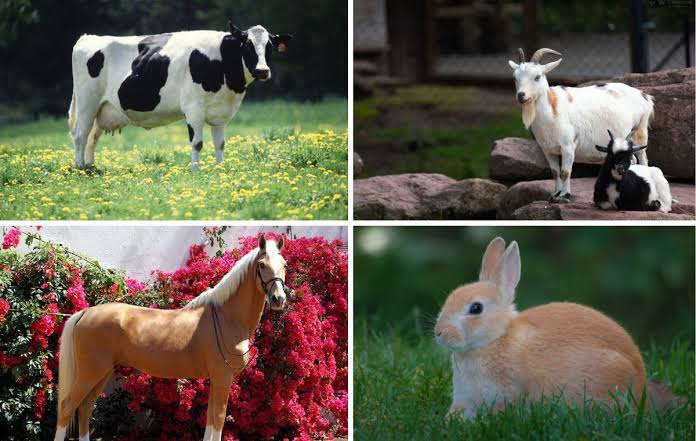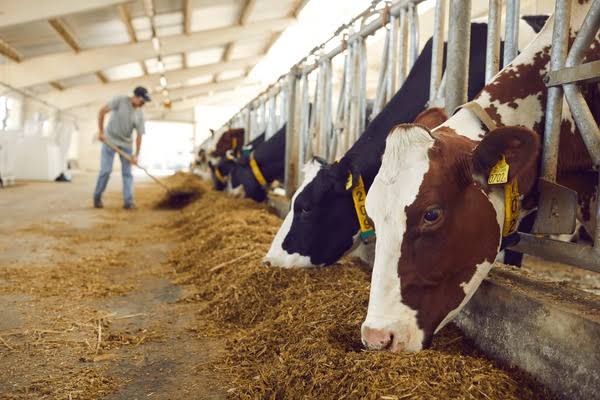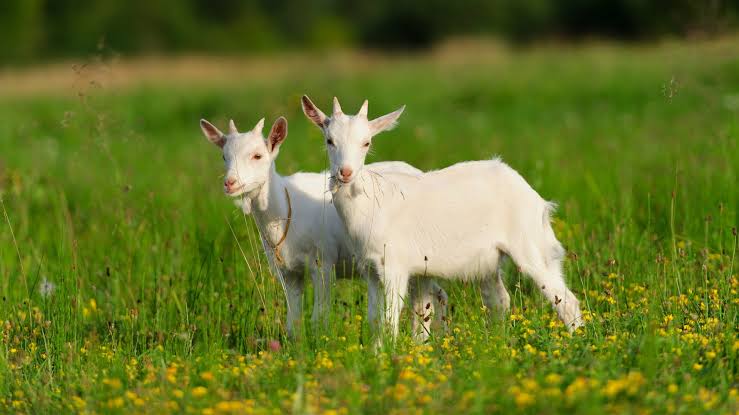Farm animals are creatures that live on farms. They are important for many reasons. People have been keeping farm animals for a long time. These animals provide us with things like food, clothing, and other useful things.
One common farm animal is the cow. Cows are big animals that give us milk. Milk is used to make many things like butter and cheese. Cows also give us meat, which people eat. Some people keep cows for their meat, while others keep them for their milk.
Another farm animal is the chicken. Chickens give us eggs, which are used in cooking. People also eat chicken meat. Chickens are often kept in a coop on the farm. They make funny clucking sounds.
Pigs are also farm animals. Pigs are smart animals, and they are kept for their meat, which is called pork. People make bacon and ham from pork. Pigs like to roll in the mud to keep cool.
Sheep are fluffy animals that give us wool. Wool is used to make warm clothes like sweaters and blankets. People also eat lamb, which comes from young sheep. Sheep are usually found in groups called flocks.
Horses are strong and helpful farm animals. They can be used for riding, pulling carts, and working on the farm. Some people even have horses as pets. Horses come in different colors and sizes.
Farmers take care of these animals on the farm. They give them food and water. Farmers make sure the animals are healthy. Farm animals need a comfortable place to live, so farmers provide them with barns or shelters.
In addition, farm animals play a big role in our lives. They give us things we need, like food and clothing. Farmers work hard to take care of these animals, and the animals, in turn, help us in many ways. Farm animals are an important part of our world.
Farm animals come in various shapes and sizes, each with its unique characteristics. Ducks and geese are water-loving birds that are also part of many farms. Ducks provide eggs and meat, while geese are known for their feathers and meat. These birds like to swim and quack loudly.
Goats are another interesting farm animal. They are known for their curious and playful nature. Goats give us milk, which can be used to make cheese and yogurt. Some people even keep goats as pets because they are friendly and have funny personalities.
Farm animals need to be healthy to provide us with the things we use. Veterinarians are like doctors for animals. They help keep farm animals well by checking on them regularly. Sometimes animals get sick, and veterinarians give them medicine to help them feel better.
On the farm, there are often dogs to help with various tasks. These dogs are called working dogs. They may help herd sheep or guard the farm. Dogs are known for their loyalty and companionship.
Farmers also grow crops on their farms. These are plants that provide us with food. Some common crops include corn, wheat, and vegetables. Farm animals eat these crops too, and the cycle of growing food helps everyone.
Farms are not just about work; they are also about nature. Farms have fields and open spaces where animals can roam. This helps them live happily. Sometimes, farms even have ponds or streams where ducks and geese can swim.
In many places, people visit farms for fun. These visits are called farm tours. During farm tours, people can see and learn about the different animals. It’s a great way for everyone to understand where their food comes from and appreciate the hard work of farmers.
In addition, farm animals are diverse and contribute in various ways to our lives. From providing us with essential food and materials to offering companionship, these animals play a vital role. Farmers, with their dedication, ensure that these creatures live well and contribute positively to the world around us. Farms are not just places of work; they are vibrant spaces where humans and animals coexist harmoniously.
Read Also: Types of Wild Dogs and their Characteristics
Benefits of Farm Animals

The benefits of farm animals are numerous and extend to various aspects of our lives. Firstly, farm animals provide a significant source of nutrition. Meat, milk, eggs, and other animal products are essential components of a balanced diet, supplying us with protein, vitamins, and minerals necessary for our health.
Farm animals also contribute to the agricultural cycle. They play a crucial role in fertilizing the soil with their manure, enhancing its fertility and aiding in the growth of crops. This creates a sustainable system where animals and plants support each other.
Moreover, farm animals are a source of income for many people. Farmers sell animal products to markets, contributing to the economy. This economic aspect helps sustain rural communities and provides livelihoods for those involved in agriculture.
Animals like horses and oxen have historically been used as valuable working companions on farms. They assist in plowing fields, transporting goods, and performing other tasks that would be challenging for humans alone. This partnership between animals and farmers enhances efficiency in agricultural activities.
The presence of farm animals also promotes biodiversity. Different species coexisting on a farm create a balanced ecosystem. For example, chickens help control insect populations by consuming bugs in the fields, contributing to natural pest control.
Additionally, farm animals offer therapeutic benefits. Interacting with animals has been shown to reduce stress and improve mental well-being. Some farms even engage in animal-assisted therapy programs, demonstrating the positive impact of animals on human emotions and mental health.
The benefits of farm animals are vast and multifaceted. From providing essential food resources to supporting agriculture and contributing to economic stability, farm animals play a crucial role in our lives. Their positive impact extends beyond practical aspects, influencing our well-being and the environment in various ways.
Furthermore, farm animals contribute to sustainable practices. Their role in recycling organic matter through manure helps reduce the reliance on synthetic fertilizers, promoting environmentally friendly farming methods. This sustainable approach not only benefits the farm but also has positive effects on the larger ecosystem.
Farm animals are integral to cultural traditions and celebrations. In many societies, certain animals hold symbolic significance and are involved in rituals or ceremonies. This cultural connection emphasizes the importance of farm animals beyond their practical utility, fostering a sense of heritage and community.
Education is another area where farm animals make a difference. Many schools and educational programs incorporate visits to farms to teach children about agriculture, animal husbandry, and the importance of a balanced diet. These hands-on experiences help instill a sense of responsibility and an understanding of where our food comes from.
The genetic diversity of farm animals is essential for future food security. Different breeds of livestock possess unique traits that make them better suited for specific environments or purposes. Preserving these diverse genetic resources ensures resilience in the face of changing climates and evolving agricultural needs.
Farm animals also contribute to the circular economy. By-products from animals, such as hides, feathers, and bones, are used in various industries. Leather, for instance, comes from the hides of cows, and feathers are used in products like pillows and quilts. This utilization of by-products minimizes waste and maximizes the value derived from each animal.
The benefits of farm animals extend far beyond their immediate contributions. They play a vital role in sustainable agriculture, cultural practices, education, genetic diversity, and the circular economy. Recognizing and appreciating these diverse contributions enhances our understanding of the interconnectedness between humans, animals, and the environment.
Read Also: Maltipoo: Description, Health and Complete Care Guide
How to Raise Farm Animals

Raising farm animals involves several key considerations to ensure their well-being and productivity. Here are general guidelines for raising farm animals:
1. Shelter: Provide appropriate housing or shelter for the specific needs of each type of farm animal. Ensure the shelter protects them from harsh weather conditions, predators, and provides adequate ventilation.
2. Nutrition: Feed animals a balanced diet suitable for their species and age. Consult with a veterinarian or animal nutritionist to determine the right feed and supplements. Ensure a steady supply of clean and fresh water at all times.
3. Healthcare: Implement a regular healthcare routine. Schedule vaccinations, deworming, and other necessary treatments. Monitor animals for signs of illness and seek veterinary assistance promptly when needed.
4. Space and Enrichment: Allow sufficient space for animals to move around comfortably. Enrich their environment with items like scratching posts, toys, or natural elements to prevent boredom and promote mental well-being.
5. Socialization: Consider the social nature of certain animals and provide appropriate companionship. Some animals thrive in groups, while others may prefer solitary living. Ensure that social structures are respected.
6. Grooming: Regularly groom animals to maintain their health and prevent issues like matting or pests. This includes brushing, hoof trimming, and other grooming practices specific to each species.
7. Reproduction Management: If breeding is part of your farm plan, manage reproduction carefully. Understand the breeding cycles of your animals, and ensure responsible breeding practices to avoid overpopulation and health issues.
8. Record Keeping: Keep detailed records of each animal, including birthdates, vaccinations, health treatments, and any other relevant information. This helps in monitoring their progress and managing their care effectively.
9. Waste Management: Implement proper waste management strategies to handle manure and other by-products. This not only keeps the environment clean but also provides a potential resource for fertilizing crops.
10. Training and Handling: Train animals to follow basic commands, making it easier to handle them for health check-ups or other necessary tasks. Gentle and positive reinforcement methods work well for most animals.
11. Compliance with Regulations: Be aware of and comply with local, regional, and national regulations related to the care and management of farm animals. This includes animal welfare standards, zoning laws, and environmental regulations.
Remember, the specific requirements can vary depending on the type of farm animal you are raising. Always seek advice from experienced farmers, veterinarians, or agricultural extension services for guidance tailored to your particular situation.
Economic Benefits of Farm Animals
The economic benefits of farm animals are substantial and contribute significantly to the agricultural sector and overall economy. Here are key economic advantages:
1. Food Production: Farm animals are a primary source of food, providing meat, milk, eggs, and other products. This contributes to food security, meeting the nutritional needs of populations and reducing dependence on imports.
2. Income Generation: The sale of farm animal products generates income for farmers. This income supports their livelihoods, sustains rural economies, and contributes to the overall economic stability of a region or country.
3. Employment Opportunities: The care and management of farm animals create employment opportunities within the agricultural sector. Jobs are generated in areas such as animal husbandry, veterinary services, feed production, and transportation.
4. Export and Trade: Many countries engage in the export of farm animal products, contributing to international trade. This not only generates revenue but also strengthens economic ties between nations.
5. By-Products Utilization: By-products from farm animals, such as hides, wool, and bones, are utilized in various industries. Leather, for example, is derived from animal hides, contributing to the textile and fashion sectors.
6. Fertilizer Production: Manure from farm animals serves as a valuable natural fertilizer. Farmers can use it to enhance soil fertility, reducing the need for synthetic fertilizers and promoting sustainable agricultural practices.
7. Biodiversity Conservation: Supporting diverse breeds of farm animals contributes to genetic biodiversity. Preserving different genetic traits enhances the resilience of livestock populations, which is crucial for adapting to changing environmental conditions.
8. Tourism and Education: Farms that incorporate educational programs or open their doors to tourists contribute to local tourism. Visitors often pay to experience farm life, learn about agriculture, and interact with farm animals.
9. Research and Innovation: Farm animals are essential subjects for research in agriculture and veterinary sciences. This research leads to innovations in animal husbandry practices, disease prevention, and the development of improved breeds, benefiting the entire industry.
10. Circular Economy: The utilization of by-products from farm animals in various industries contributes to a circular economy. This minimizes waste, maximizes resource efficiency, and adds value to the entire production process.
11. Rural Development: Successful farming enterprises centered around animals can stimulate rural development. The economic benefits extend beyond the farm itself, positively impacting local businesses, infrastructure, and services.
In summary, the economic benefits of farm animals are diverse and extend across multiple sectors. From direct contributions to food production and income generation to indirect impacts on trade, employment, and research, farm animals play a vital role in fostering economic growth and sustainability.
Read Also: Fate and Transport of Micro-organisms in Air

